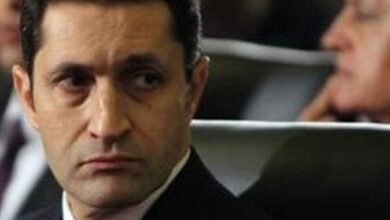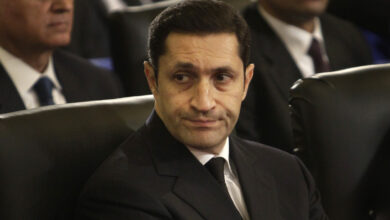
After months of interrogations of former President Mohamed Hosni Mubarak and his two sons, beginning on 10 April 2011, the trial began on 3 August 2011. The trial continued, holding over 45 sessions, from 3 August 2011 to 22 February 2012, when the head of the court, Judge Ahmed Refaat, set 2 June, 2012 as the date for issuing a verdict.
There were 11 defendants in the trial:
- Former President Hosni Mubarak
- Fugitive businessman Hussein Salem
- Gamal Mubarak son of the former president
- Alaa Mubarak, son of the former president
- Former Interior Minister Habib al-Adly
- Former First Assistant Interior Minister for the Central Security Forces Sector Major General Ahmed Mohamed Ramzy Abdel Rashid
- Former First Assistant Interior Minister for Public Security Major General Adly Mostafa Fayed
- Former First Assistant Interior Minister for the State Security Agency Major General Hassan Abdel Rahman
- Former head of Cairo Security Directorate Major General Ismael al-Shaer
- Former head of Giza Security Directorate Major General Osama al-Marassi
- Former head of 6th of October Security Directorate Major General Omar al-Farmawy
The proceedings unfolded as follows:
3 August 2011: A procedural session in which the accusations were recited.
15 August 2011: The judge ruled that Mubarak, his two sons and businessman Hussein Salem would be tried on corruption charges in the same trial in which Mubarak, former Interior Minister Habib al-Adly and six former security officials were accused of killing protesters. The judge banned cameras and live broadcast of the trial.
5-15 September 2011: Prosecution witnesses gave testimony over seven sessions. The most notable were former Vice President Omar Suleiman on 13 September, the interior minister at that time, Mansour al-Essawy, on 14 September, and former Interior Minister Mahmoud Wagdy on 15 September. On 14 September Field Marshal Hussein Tantawi, head of the ruling military council, demanded that his testimony be postponed from 11 to 24 September.
3-5 January 2012: The prosecution made its argument over three sessions.
9-10 January 2012: Civil attorneys representing the families of those killed during the 25 January uprising made arguments over two sessions.
17-22 January 2012: The Mubaraks’ lawyer, Farid al-Deeb, made arguments over five sessions.
23 January-16 February 2012: The other defendants’ lawyers made arguments over 20 sessions.
22 February 2012: During the final session, the judge announced that a verdict would be issued on 2 June 2012.
Charges:
Former President Mubarak, Adly, and the six former security officials are charged with inciting, agreeing to and taking part in the willful killing of protesters between 28 January and 31 February 2011.
Former President Mubarak, his sons Gamal and Alaa, and Hussein Salem are charged with financial crimes. The first charge is that Salem allocated to Mubarak and his two sons five villas in Sharm el-Sheikh in exchange for public lands being sold to him at below-market prices and the second is related to selling natural gas to Israel at prices below international standards.
Trial referral decision:
In the first session on 3 August 2011, the prosecutor recited the decision in which he referred Mubarak and the other 10 defendants to trial.
The prosecutor stated that Mubarak “took part, through agreeing with Adly, in the premeditated murder of protesters,” and that he “allowed the use of firearms and vehicles that helped the police in carrying out the crime…without using his powers to stop the crime.”
The prosecutor said: “The first defendant (Mubarak) accepted to take for himself along with the third and fourth defendant, his two sons, the gift described and valued in the investigations. It included 5 villas…according to phony contacts from the second defendant Hussein Salem, in return for [Mubarak] abusing his public authority in South Sinai Governorate and allocating [for Salem] the lands described and valued in the investigations. [The lands] which comprise over two million square meters were [allocated] to the Naama for Golf and Tourism Investment Company.”
With regard to the export of gas, the prosecutor said that Mubarak “agreed with former Petroleum Minister Sameh Fahmy on ordering the sale and export of Egyptian gas to Israel, through the East Mediterranean Gas Company, owned by Salem. [Mubarak] mentioned the name of the company in a request [to Fahmy]”
“[Fahmy] agreed to contract with the company upon direct order without following the right legal measures, at a price below the international standards.”
The court:
- Head of the court and head of the North Cairo Criminal Court Judge Ahmed Refaat
- Judge Mohamed Assem Bassiouny
- Judge Hany Borham
Lawsuit to replace the judges:
Civil attorney Abdel Aziz Amer filed a claim demanding that the judges be replaced for not allowing lawyers to question Field Marshal Hussein Tantawi during his testimony. He added that one of Tantawi’s guards pushed a lawyer to the ground. The court which considered the claim rejected it and fined Amer LE6,000.
Mubarak’s bill since the revolution:
In a study prepared by Abdel Moneim al-Sayed, a member of the International Arbitration Center, he listed the following costs:
- Mubarak’s medical expenses at Sharm al-Sheikh Hospital since his resignation: LE175 million
- Cost of transferring the interrogation team during the first 174 days Mubarak spent in Sharm el-Sheikh: LE15 million
- Cost of transferring Mubarak from Sharm al-Sheikh to the court in Cairo using a helicopter, including the wages of the security guards: LE300 million.
- Cost of transferring Mubarak from the International Medical Center to the court: LE25 million.
- Cost of securing the court: LE12 million.
Mubarak’s place of detention during the trial:
Mubarak remained under house arrest in the Sharm el-Sheikh resort town in South Sinai until the trial started.
The court ordered in the first session on 3 August 2011 that Mubarak be transferred to the International Medical Center on the Cairo-Ismailia desert highway.
The People’s Assembly Health Committee recommended that Mubarak be transferred to Tora Prison Hospital like other prisoners. However, he was not transferred and continued to be detained in the International Medical Center.
Where Mubarak could be imprisoned if found guilty:
Some experts believe that as a military officer Mubarak would spend his prison sentence in a military prison. His lawyer, Farid al-Deeb, has focused on the fact that the Mubarak is still an army lieutenant, based on Article 1 and 3 of Law No. 35 of 1979 which says that leaders in the October War victory are considered to be in military service until the end of their lives, and, if they are appointed in civilian posts, as was the case with Mubarak, they should return to their military service following the end of their term of office.
Other experts pointed out that according to Article 123 of the Code of the Military Judiciary, if a judge issued a final verdict against Mubarak, a consequential punishment that should affect Mubarak as a military officer is expulsion from military service and deprivation of all military awards and ranks. In this case, he would be treated as a civilian and could spend his prison sentence in a civilian prison.
Place of trial:
After considering different suggestions about where to hold the trial (including the Exhibition Land in Nasr City), the trial was held in the Police Academy, previously Mubarak Academy, in the Fifth Settlement in New Cairo. The trial was held in Hall 1, a lecture hall in the main building of the academy.
The Arab Contractors Company prepared the hall and the dock. An iron fence was built to divide the room intp two parts so as to separate Mubarak’s supporters and the defendant’s families from the martyrs’ and injured peoples’ families.
Preparing the court room cost several million pounds, some estimated it at LE6 million.
Court security:
Both the armed forces and the Interior Ministry took part in securing the trial.
More than 20 armored vehicles belonging to the Interior Ministry and 3,000 officers and soldiers from the Central Security Forces were deployed outside the academy.
The armed forces were responsible for imposing a security cordon at the entrances of the academy and checking the permits of those allowed to attend the trial. Dogs, metal detectors and x-rays were used to inspect the attendees, who left their mobile phones with security before entering the academy.
A landing pad was prepared for the helicopter that transported Mubarak between the medical center and the court.
Attendees:
The court was prepared to receive about 600 people including the lawyers and the defendants’ families. Journalists and reporters allowed to attend the trial obtained permits from the head of the Cairo Court of Appeals after providing a formal letter from the General Authority for Information stating the name of the newspaper or media outlet they represent.
Trial broadcast:
The first and second sessions of the trial were broadcasted live on television after Refaat announced in a press conference he would allow the trial to be aired on state TV. However, in the second session, Refaat decided to ban broadcasts of the trial to protect public interests. Starting from 5 September, sessions were not broadcasted.
Prosecution:
- Counselor Mostafa Suleiman, first attorney general of the Cairo Appeals Prosecution
- Counselor Mostafa Khater, attorney general of the Cairo Appeals Prosecution
- Counselor Wael Hussein, attorney general of the Cairo Appeals Prosecution
The prosecution’s argument:
Suleiman presented the first part of the argument in which he described Mubarak as a pharaoh and a despot who wreaked havoc on the land. He added that Mubarak dedicated the last decade of his rule to achieving personal interests and committing a sin not committed by any of Egypt’s former presidents — forging the will of the people and spoiling political life as part of a hereditary succession project.
Suleiman, Khater and Hussein all made arguments about the killing of protesters. They recited the testimonies of eyewitnesses and the circumstances surrounding the deaths. They demanded the death penalty for all the defendants.
Hussein argued the portion of the case that dealt with financial crimes.
The defense’s argument:
Farid al-Deeb, who represented the Mubaraks, denied Mubarak’s responsibility for killing protesters and held the Supreme Council of Armed Forces responsible as the armed forces were deployed in streets on 28 January 2011.
Deeb also argued that Mubarak is still president of the republic and that his resignation was invalid.




